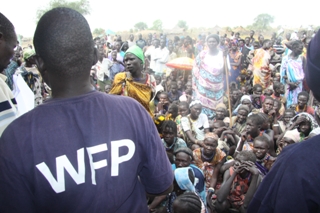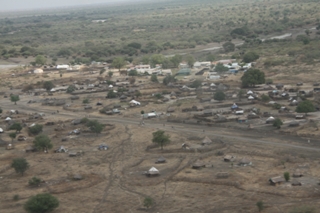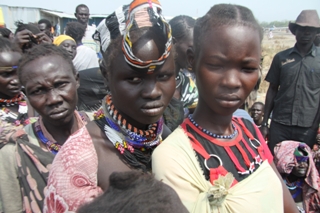Pibor county internal displaced people claim food is not enough
January 20, 2012 (PIBOR) – Thousand of women from Murle in Pibor County receiving food rations from the UN’s World Food Program after ethnic violence in the area complain that food there is not enough to food to support them.

Murle groups have responded to the attack by attacking Uror and Duk Padiet Counties. Around 120,000 people have been displaced by the violence.
Over 50,000 displaced people are now receiving emergency food rations from WFP in Pibor County.
Speaking to the press, James Jok Keya Papa, the deputy director of Pibor town’s deputy South Sudan Relief Rehabilitation Commission said that inter-communal violence had seriously affected people’s livlihoods and their ability to support themselves.
Most of those affected by conflict are women, children and elderly people, he said.
Jok say that the food being distributed to displaced people is not enough because of the rising number of people coming to Pibor county headquarters seeking food and safety. He said that over five highly populated payams [districts] of Pibor County have been burnt to ashes during the violence.
Gabriel Ajak, the World Food Program Field Monitor for the area said that more displaced people were being registered on a daily basis.
He said that one individual receives 500g of cereals, 50g of beans, 30g of vegetable oil, and 5g of salt per day for 15 days as emergency ratios.

“The youth should remove tribalism in their hearts,” he said.
“In every country, there are tribes who always live together at peace. We cannot have a country without tribes. I want to tell the youth that this is no time
for fighting. This is time for peace”, Jok said.
The commissioner of Pibor County, Joshua Konyi declared on Friday that he would try and create a buffer zone along tribal borders to monitor the movement of raiders and help end the cycle of violence.
Konyi’s estimate that over 3,000 Murle have died in the fighting has been dismissed by the UN Mission in South Sudan.

The commissioner said that he was worried that the tactics of cattle rustling had changed as women and children are now often killed and kidnapped.
The Pibor County Commissioner praised the humanitarian intervention on UNMISS including saving the life of a child found alive on her dead mothers back in the bush a week after the attack.
WFP has also dispensed life-saving rations to the victims of reprisal attacks.
In various interviews held in Akobo and in Pibor County, youth leaders from both groups told Sudan Tribune they are ready for peace.
(ST)
